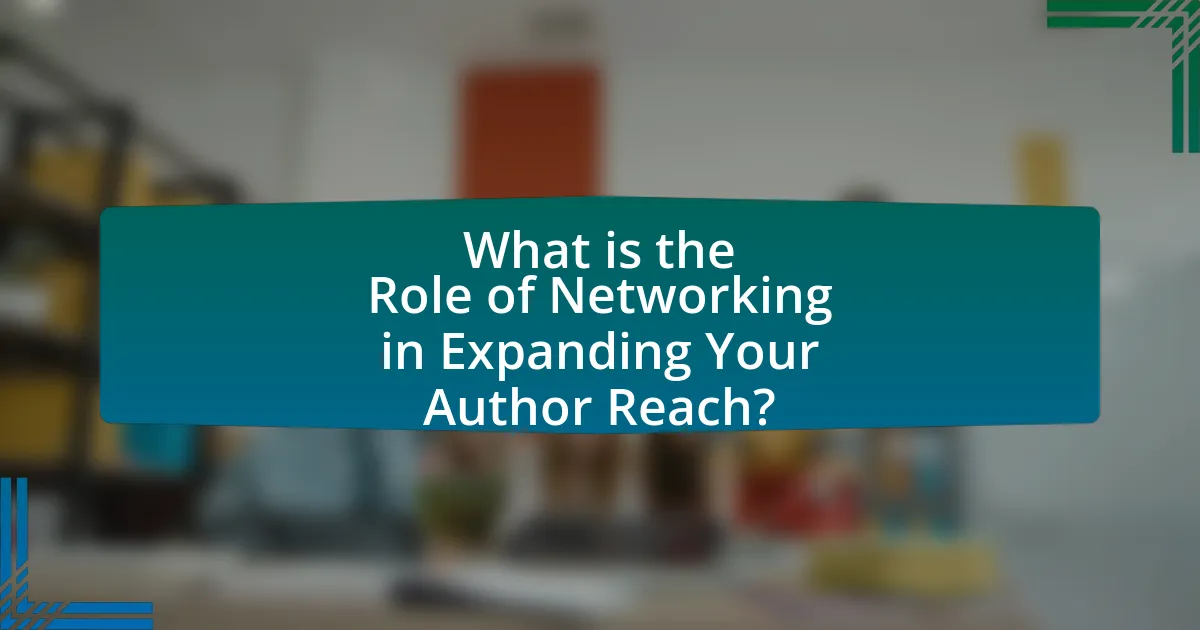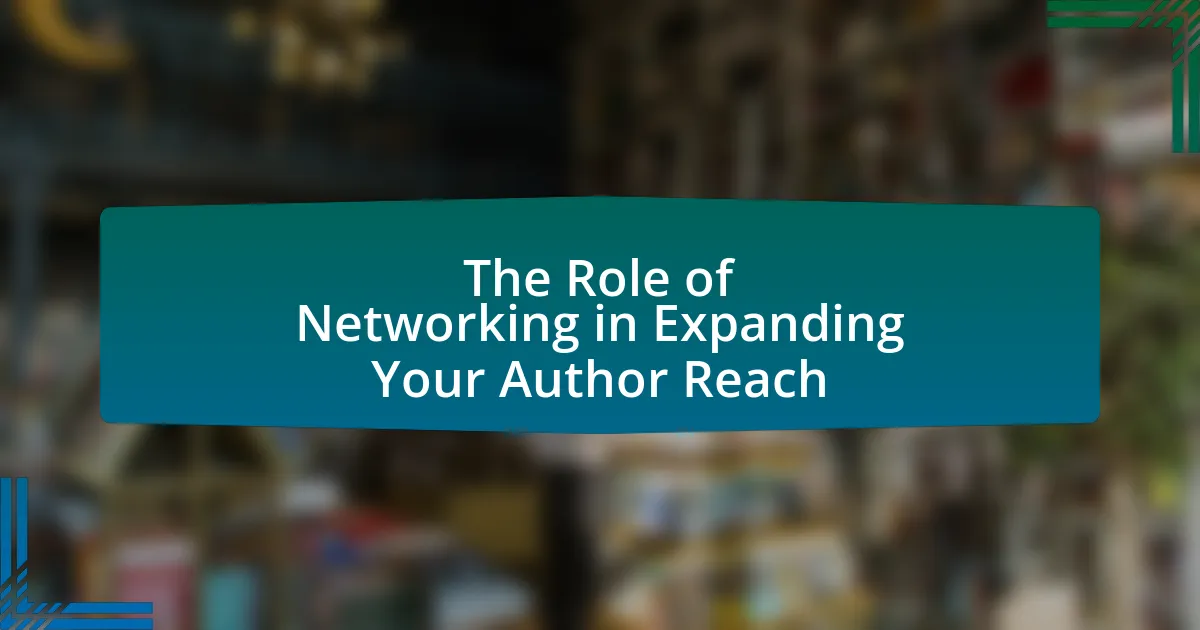Networking is a vital component for authors seeking to expand their reach and visibility in the literary market. This article explores the significance of networking in enhancing an author’s credibility, facilitating collaborations, and providing access to valuable resources. Key strategies for effective networking, such as attending literary events, engaging on social media, and joining professional organizations, are discussed, along with the challenges authors face without these connections. Additionally, the article highlights how authors can leverage various networking opportunities to foster relationships that lead to increased readership and career growth.

What is the Role of Networking in Expanding Your Author Reach?
Networking plays a crucial role in expanding an author’s reach by facilitating connections with other writers, industry professionals, and potential readers. These connections can lead to collaborative opportunities, increased visibility, and access to new audiences. For instance, authors who engage in networking often participate in events such as book fairs, writing workshops, and online forums, which can enhance their credibility and promote their work. Research indicates that 85% of jobs are filled through networking, highlighting its effectiveness in creating opportunities. In the literary world, similar dynamics apply; authors who network effectively can leverage relationships to gain endorsements, participate in joint promotions, and receive invitations to speaking engagements, all of which contribute to a broader readership.
How does networking influence an author’s visibility?
Networking significantly enhances an author’s visibility by facilitating connections with industry professionals, readers, and other authors. These connections can lead to collaborative opportunities, increased exposure through shared platforms, and access to valuable resources such as marketing strategies and promotional events. For instance, authors who engage in networking often gain invitations to literary events, book signings, and speaking engagements, which can substantially raise their profile. Research indicates that authors who actively network are more likely to achieve higher sales and broader readership, as they tap into established audiences and leverage word-of-mouth recommendations.
What are the key networking strategies for authors?
Key networking strategies for authors include attending literary events, engaging on social media, collaborating with other writers, and joining professional organizations. Attending literary events such as book fairs and author readings allows authors to meet industry professionals and potential readers, fostering valuable connections. Engaging on social media platforms like Twitter and Instagram helps authors build their brand and interact with their audience, which can lead to increased visibility and opportunities. Collaborating with other writers through joint projects or cross-promotions can expand an author’s reach to new audiences. Joining professional organizations, such as the Authors Guild or local writing groups, provides networking opportunities and resources that can enhance an author’s career. These strategies are effective as they create direct pathways for authors to connect with peers, industry insiders, and readers, ultimately expanding their reach and influence in the literary community.
How can networking enhance an author’s credibility?
Networking enhances an author’s credibility by facilitating connections with industry professionals, which can lead to endorsements and collaborations that validate the author’s expertise. When authors engage with other writers, publishers, and literary agents, they gain access to a community that can provide support and recognition. For instance, a study by the National Endowment for the Arts found that authors who participate in literary events and workshops are more likely to receive positive reviews and increased visibility, thereby enhancing their credibility in the eyes of readers and peers.
Why is networking essential for authors in today’s market?
Networking is essential for authors in today’s market because it facilitates connections that can lead to increased visibility and opportunities for collaboration. In a competitive publishing landscape, authors who engage with peers, industry professionals, and readers can share resources, gain insights, and enhance their marketing efforts. For instance, a survey by the Author’s Guild found that 70% of authors attribute their book sales to networking activities, highlighting its impact on reaching wider audiences. Additionally, networking can provide access to valuable mentorship and guidance, which is crucial for navigating the complexities of publishing and marketing in the digital age.
What challenges do authors face without networking?
Authors face significant challenges without networking, primarily limited visibility and reduced opportunities for collaboration. Without connections in the literary community, authors struggle to promote their work effectively, leading to lower book sales and diminished audience engagement. Networking facilitates access to industry insights, mentorship, and promotional platforms, which are crucial for career advancement. Research indicates that authors who engage in networking are more likely to secure publishing deals and gain readership, as relationships often lead to referrals and collaborative projects. Therefore, the absence of networking can severely hinder an author’s professional growth and market presence.
How does networking contribute to an author’s career growth?
Networking significantly contributes to an author’s career growth by providing opportunities for collaboration, visibility, and access to industry resources. Through networking, authors can connect with other writers, publishers, and literary agents, which can lead to co-authoring projects, invitations to speaking engagements, and increased exposure to potential readers. For instance, a study by the Authors Guild found that authors who actively engage in networking are more likely to secure book deals and gain recognition in their field. This demonstrates that building relationships within the literary community can directly impact an author’s success and career trajectory.

What types of networking opportunities are available for authors?
Authors have access to various networking opportunities, including literary festivals, writing workshops, online forums, and social media platforms. Literary festivals allow authors to connect with readers, publishers, and fellow writers, fostering relationships that can lead to collaborations and promotional opportunities. Writing workshops provide a space for authors to share their work and receive feedback, while also meeting industry professionals. Online forums and social media platforms, such as Twitter and Facebook groups, enable authors to engage with a broader community, share resources, and participate in discussions relevant to their writing. These networking avenues are essential for authors looking to expand their reach and establish a presence in the literary world.
How can authors leverage social media for networking?
Authors can leverage social media for networking by actively engaging with readers, fellow authors, and industry professionals through platforms like Twitter, Instagram, and Facebook. By sharing insights, participating in discussions, and promoting their work, authors can build relationships that enhance their visibility and credibility. Research indicates that 77% of authors use social media to connect with their audience, which can lead to increased book sales and collaboration opportunities. Engaging in relevant hashtags and joining writing communities further amplifies their reach and fosters meaningful connections within the literary community.
What platforms are most effective for authors to connect with readers?
Social media platforms such as Facebook, Instagram, and Twitter are most effective for authors to connect with readers. These platforms allow authors to engage directly with their audience through posts, comments, and live interactions, fostering a sense of community. For instance, Facebook groups dedicated to specific genres enable authors to share their work and receive feedback, while Instagram’s visual nature allows authors to showcase their books creatively. According to a 2021 survey by the Author’s Guild, 70% of authors reported that social media significantly increased their visibility and reader engagement.
How can authors use online writing communities to expand their reach?
Authors can use online writing communities to expand their reach by actively participating in discussions, sharing their work, and networking with other writers and readers. Engaging in these communities allows authors to gain visibility, receive feedback, and connect with potential readers who share similar interests. For instance, platforms like Wattpad and Scribophile enable authors to showcase their writing, which can lead to increased readership and opportunities for collaboration. Research indicates that authors who engage with online communities often see a significant boost in their audience size, as these platforms facilitate word-of-mouth promotion and foster relationships that can lead to book sales and further networking opportunities.
What role do literary events play in networking?
Literary events serve as crucial platforms for networking among authors, publishers, and literary professionals. These gatherings facilitate direct interactions, allowing participants to establish relationships, share ideas, and collaborate on projects. For instance, events like book fairs and literary festivals often attract industry leaders, providing authors with opportunities to pitch their work and gain visibility. Research indicates that 70% of authors find new contacts and potential collaborators at such events, highlighting their effectiveness in expanding professional networks.
How can attending book fairs benefit an author’s network?
Attending book fairs can significantly enhance an author’s network by providing direct access to industry professionals, fellow authors, and potential readers. These events facilitate face-to-face interactions, allowing authors to establish relationships with publishers, agents, and other writers, which can lead to collaborative opportunities and increased visibility. For instance, the American Library Association Annual Conference attracts thousands of attendees, creating a rich environment for networking. Additionally, authors can participate in panels and discussions, further showcasing their expertise and expanding their reach within the literary community.
What strategies should authors use when networking at events?
Authors should engage in active listening and meaningful conversations when networking at events. This strategy allows authors to build genuine connections, as it demonstrates interest in others’ work and fosters rapport. Research indicates that effective networking relies on the quality of interactions rather than the quantity, with studies showing that strong relationships can lead to collaborative opportunities and increased visibility in the literary community. Additionally, authors should prepare an elevator pitch to succinctly convey their work and goals, which can facilitate introductions and spark interest among peers and industry professionals.

How can authors effectively build and maintain their network?
Authors can effectively build and maintain their network by actively engaging with peers, readers, and industry professionals through social media, writing groups, and literary events. Engaging on platforms like Twitter and Instagram allows authors to connect with a broader audience, while participating in local writing workshops or book fairs fosters personal relationships. Research indicates that networking can lead to collaborative opportunities, increased visibility, and access to resources, which are crucial for an author’s career development. For instance, a study by the American Society of Journalists and Authors found that 70% of authors attribute their success to networking efforts.
What are the best practices for networking as an author?
The best practices for networking as an author include attending literary events, engaging on social media, and collaborating with other writers. Attending literary events such as book fairs, author readings, and writing conferences allows authors to meet industry professionals and fellow writers, fostering valuable connections. Engaging on social media platforms like Twitter and Instagram helps authors build their brand and interact with readers and other authors, creating a supportive community. Collaborating with other writers on projects, such as anthologies or joint promotions, can expand an author’s reach and introduce them to new audiences. These practices are supported by the fact that networking can lead to opportunities for book deals, speaking engagements, and increased visibility in the literary market.
How can authors follow up with new contacts after networking events?
Authors can follow up with new contacts after networking events by sending personalized emails or messages that reference specific conversations or shared interests. This approach fosters a connection and demonstrates genuine interest, which is crucial for building relationships. Research indicates that personalized communication increases response rates by 29% compared to generic messages. Additionally, authors should consider connecting on social media platforms like LinkedIn, where they can engage with their contacts’ content and maintain visibility. Following up within 24 to 48 hours of the event is optimal, as it keeps the interaction fresh in both parties’ minds.
What tools can authors use to manage their networking efforts?
Authors can use social media platforms, email marketing tools, and professional networking sites to manage their networking efforts. Social media platforms like Twitter and Facebook allow authors to connect with readers and other writers, facilitating engagement and community building. Email marketing tools such as Mailchimp enable authors to maintain direct communication with their audience, sharing updates and promotions effectively. Professional networking sites like LinkedIn provide authors with opportunities to connect with industry professionals, enhancing their visibility and potential collaborations. These tools collectively support authors in expanding their reach and fostering meaningful relationships within the literary community.
How can authors measure the impact of their networking efforts?
Authors can measure the impact of their networking efforts through metrics such as increased book sales, social media engagement, and collaboration opportunities. By tracking sales data before and after networking events, authors can identify correlations between their networking activities and sales performance. Additionally, monitoring social media metrics, such as follower growth and engagement rates, provides insight into how networking expands their online presence. Collaboration opportunities, such as guest blogging or joint events, can also serve as indicators of successful networking, as they often lead to broader audience reach and enhanced credibility.
What metrics should authors track to evaluate networking success?
Authors should track metrics such as the number of new connections made, engagement rates on social media posts, and the frequency of collaboration opportunities to evaluate networking success. Tracking the number of new connections provides insight into the growth of an author’s professional network, while engagement rates indicate how well their content resonates with their audience. Additionally, monitoring collaboration opportunities can reveal the effectiveness of networking efforts in creating partnerships that enhance visibility and reach. These metrics collectively offer a comprehensive view of an author’s networking effectiveness and its impact on expanding their reach.
How can authors adjust their networking strategies based on feedback?
Authors can adjust their networking strategies based on feedback by analyzing the responses they receive from peers, readers, and industry professionals. For instance, if feedback indicates that certain platforms yield more engagement, authors should prioritize those channels for networking. Additionally, if constructive criticism highlights gaps in their approach, such as a lack of interaction or collaboration, authors can modify their strategies to include more active participation in discussions and events. Research shows that authors who adapt their networking based on audience feedback can increase their visibility and connections, ultimately enhancing their reach and influence in the literary community.
What practical tips can authors implement to enhance their networking skills?
Authors can enhance their networking skills by actively participating in writing groups and attending literary events. Engaging in writing groups allows authors to share experiences, receive feedback, and build relationships with peers, which can lead to collaborative opportunities. Attending literary events, such as book fairs and author signings, provides authors with direct access to industry professionals and fellow writers, facilitating meaningful connections. Research indicates that networking can significantly impact career advancement; for instance, a study by the National Endowment for the Arts found that 70% of jobs are obtained through networking. Therefore, by consistently engaging in these activities, authors can effectively expand their professional network and increase their visibility in the literary community.



